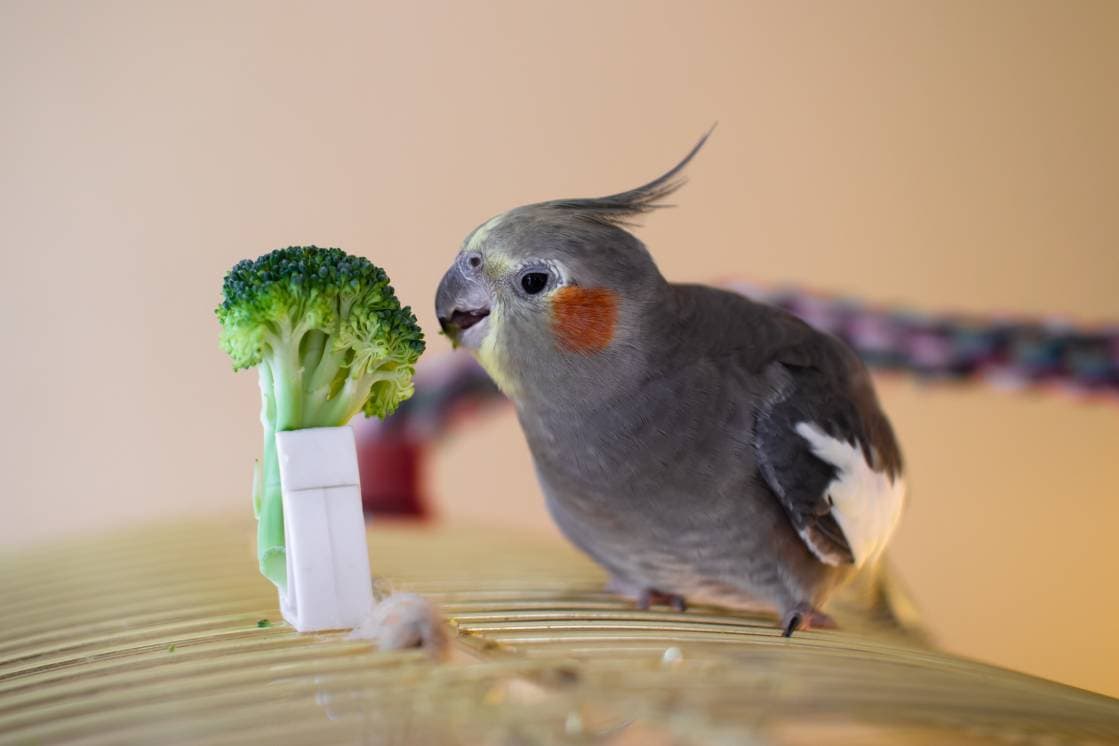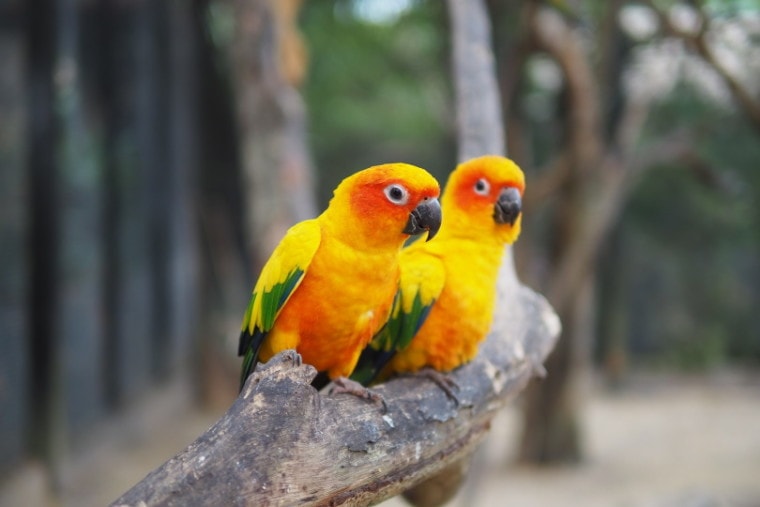
Sun conures are stunning birds. They have both vivid plumage and vivid personalities. A sun conure is a variety of parrot. They are brilliant, like to vocalize, and are well-known for having an adventurous nature.
These birds are thought to be one of the smaller versions of a parrot. They are exceptionally long-lived and highly social birds. If you don’t have a great deal of time to give them every day, these might not be the right birds for you.
Sun conures are best known for their stunning beauty and for having a big mouth.
Species Overview
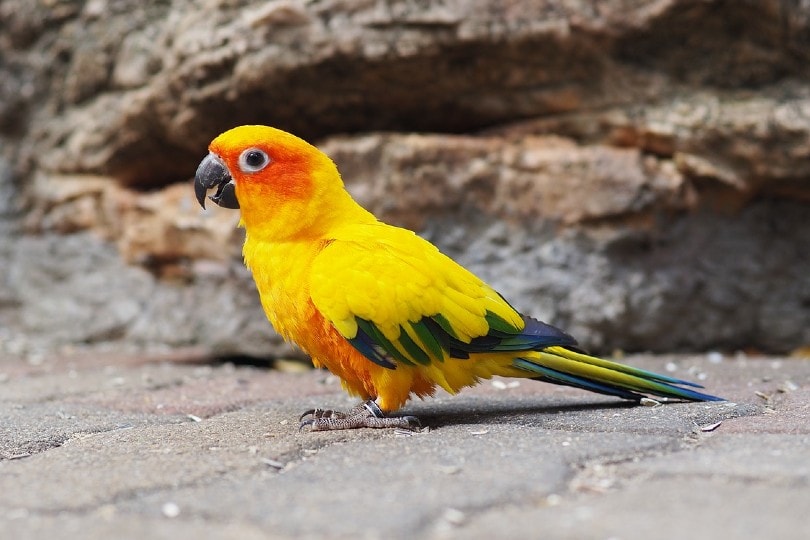
| Common Name: | Sun conure, Sun parakeet |
| Scientific Name: | Aratinga solstitialis |
| Adult Size: | 12 inches long |
| Life Expectancy: | >20 years |
Origin and History
Sun conures are native to regions in South America. They are primarily found across the northern part of South American, in Venezuela, northern Brazil, and Guyana. The birds are typically located in tropical habitats away from the coastline, although they have been found in drier savanna forests and coastal forests.
This tree-loving species prefers groves of palms and fruiting trees. These make up their home, as well as much of their diet. The bird was imported and traded in the United States for many years, until the ban of their import in 1992. They were banned in the EU in 2007.
Even with the ban, approximately 800,000 of these birds are still trapped each year. They are a dwindling species in the wild, currently considered endangered. Part of this is due to the pet trade, and part of it is habitat loss.
Temperament
Sun conures are unique and amusing birds. They have a loud personality to match their capacity for mouthiness and volume. These birds are athletic and enjoy learning tricks that put them in the spotlight. They are also extremely smart, and you can train them quickly with a bit of persistence.
One of the reasons that sun conures are such a popular bird in the pet industry is their affectionate nature. These cuddly birds are gentle and docile. If they are provoked, they may become aggressive, though. Outside of mistreatment, they are keen to bond closely with their caretakers.
Sun conures might go through nippy phases that they need to be trained out of if they will get along well with the rest of their family members. Sun conures are especially social parrots and require a considerable amount of interaction. If you do not have someone at home consistently, then these are not the right birds for you.
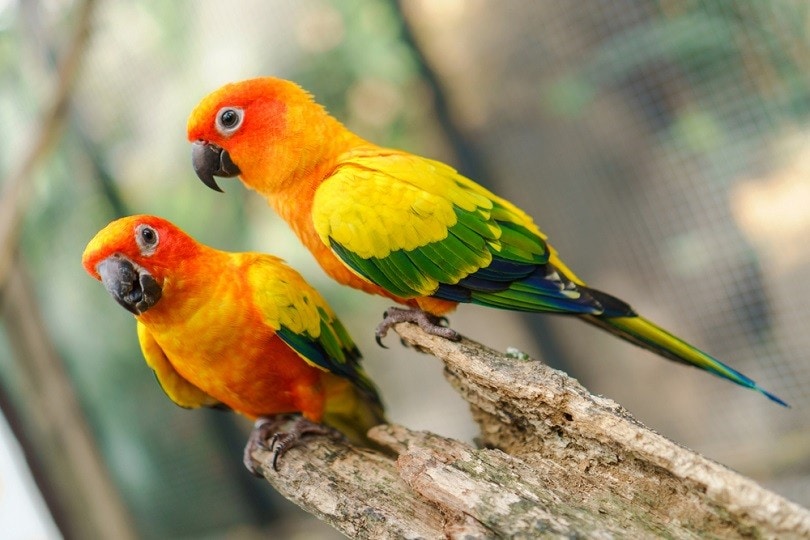
Speech & Vocalizations
The sun conure is a loud bird known for their harsh calls. In the wild, they can be heard for many miles when they call back and forth between their neighbors. It is this volume that makes them unsuitable for those who live in apartments.
It is also not feasible to expect that you can train their calls out of them, though you can curb excessive screaming.
Conures also communicate their emotions through their calls. They are not shy about letting you know if they are bored or want your attention.
Sun Conure’s Colors and Markings
There are quite a few different parrots and conures, but sun conures stand apart in their coloration. When they reach maturity, a sun conure looks similar to their namesake, seeming to glow like the sun across most of their plumage.
A sun conure is bright orange and yellow on their body. They can have shades of green and blue on their wing feathers. When they are still in their juvenile forms, they are not that colorful, especially when compared to their adult counterparts.
As a young bird ages, they first begin to get olive green, with a tinted color that slowly changes into a yellowish-orange color. This happens around 6 months of age. At approximately 1 year old, a sun conure will reach their full-color plumage.
Adult sun conures end up with grey-black beaks and feet, along with white circles around their eyes.
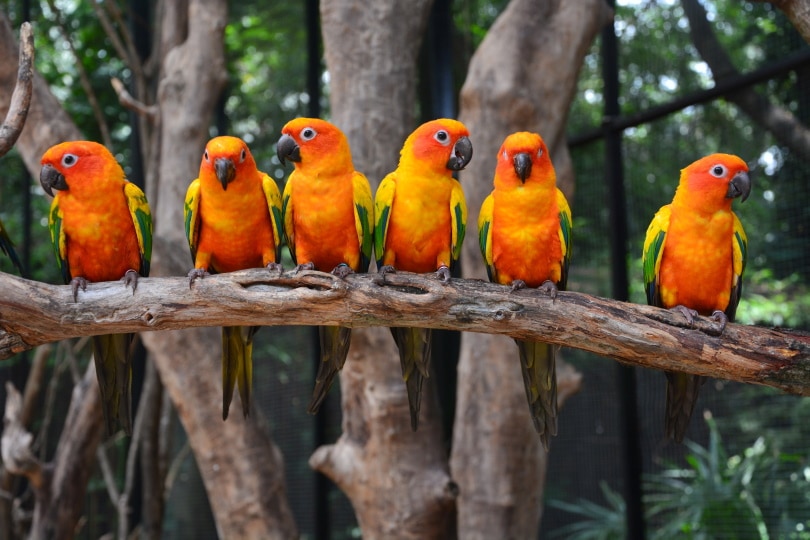
Caring for the Sun Conure
The sun conure is a happy bird that enjoys being active, thus needing quite a roomy enclosure. The cage needs to be 20 inches by 20 inches and at least 36 inches tall. The cage must have narrow bars, about ¾ of an inch. Sun conures will want to try to escape and can get their head stuck in the bars.
The sun conure needs plenty of time outside of their enclosure to enjoy exploring and investigating a new space. They love to climb and play gym, getting the opportunity to stretch out their legs and wings. If they do not get this opportunity, then they can become destructive.
Conures will need a bit of training, although they do not take scolding well. They need socialization so they learn how to behave appropriately with people.
- Related Read: Why Does My Conure Bob Its Head? (And How to Stop It)

Common Health Problems
Sun conures are prone to feather picking, like many other parrots. Medical reasons might cause them, but often, it is more of a sign that they are not getting enough attention and socialization. It can be a result of boredom as well.
Like any other avian, conures are prone to experience viral conditions that come on quickly and can quickly cause disease and death.
All of these indicate that your bird should be taken to an avian vet quickly to get an annual exam. If they are ill, quick action is the best way to ensure their safety.
Diet and Nutrition
Sun conures primarily enjoy feasting on a variety of nuts, fruit, and seeds. Formulated pellet diets often fulfill this because they are supplemented with fruits and vegetables.
You can also give them treats in the form of fresh fruits and vegetables. They are not prone to overeating, so feel free to provide them with an unlimited amount of balanced pellet food. They can also get about ¼ of a cup of fruits and veggies in the morning and the evening.
Nuts should be treated as treats for these birds because they are high in fats. Too many can cause unhealthy weight gain or poor organ development.
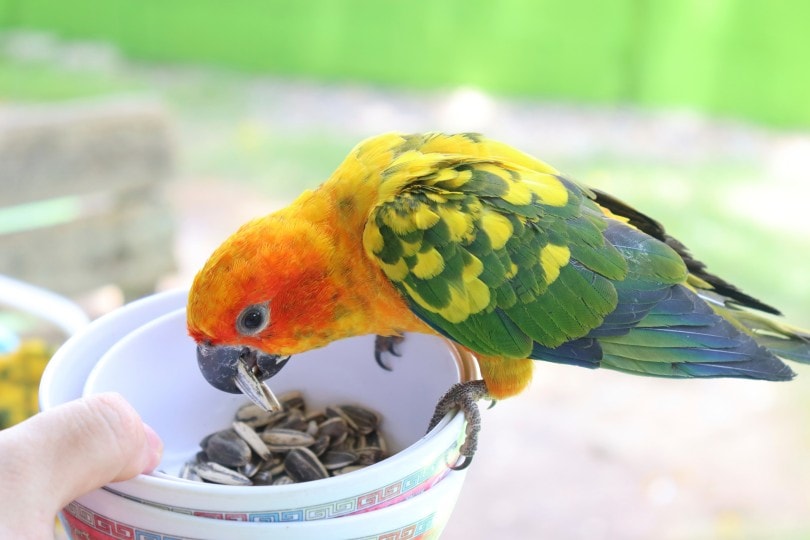
Exercise
The sun conure needs plenty of exercise to stay in good health. They are active and need plenty of space and time to fly around and explore. They need more than other domesticated birds, requiring at least 3 hours outside of the cage each day.
They need toys to play with and preferably a companion too.
Where to Adopt or Buy a Sun Conure
Sun conures often cost between $500 to $700. They should be certified as bred under human care because that guarantees that your adoption will not further the illegal import trade. You can adopt these birds through breeders and rescue shelters too.
Check into any breeders and get their vet records if possible. This will make for a healthier bird in the end because you will be aware of any past issues and potential issues with their parents.

Last Thoughts
Sun conures are beautiful birds that make their presence known by being vocal. They are not shy and need plenty of time interacting with their caretakers to feel satisfied. If they stay bored, alone, or inactive for too long, then they will probably begin exhibiting destructive behavior, like feather plucking. Giving them plenty of time outside of their enclosure and a few cuddles will be all they need to live a long, happy, loud life.
Featured Image Credit: Rutpratheep, Pixabay



